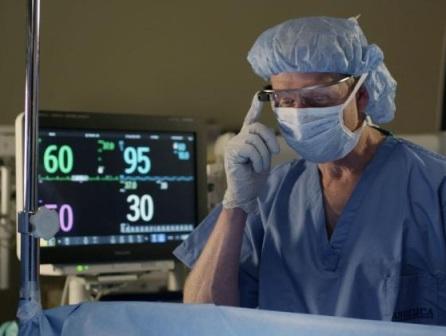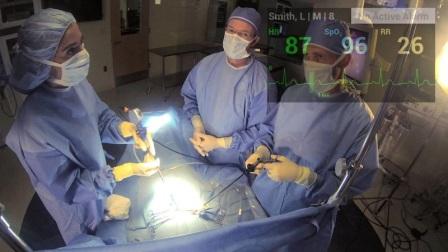Royal Philips has jumped into wearable technology through Google Glass. The company (perhaps best known for its high efficiency lighting solutions relative to the general public) has an extensive focus on health and well-being and on improving people's lives through meaningful innovation in the areas of healthcare, consumer lifestyle and lighting. The company provides solutions for cardiac care, acute care and home healthcare, and is now looking to add Google Glass to its extensive repertoire.
Philips offers a comprehensive portfolio of patient monitoring solutions ranging from bedside monitors to wearable patient monitors, combined with clinical decision support tools and mobile applications to provide immediate access to centrally held patient data. More than 190 million patients are monitored each year with Philips' patient monitors.
Given this background and focus it is hardly surprising that the company announced today the creation of a proof-of-concept demonstration that uses a Google Glass head-mounted display for researching ways to improve the effectiveness and efficiency of performing surgical procedures. The concept takes Philips into the world of hands-free wearable technology. To explore the potential uses of Google Glass specifically in clinical settings researchers from Philips' newly created Digital Accelerator Lab, a cross-sector innovation platform with labs based in the Netherlands and India, collaborated with researchers from Accenture Technology Labs.
The goal was simple enough - to create the first proof of concept for Google Glass and Philips IntelliVue Solutions and to then begin exploring additional opportunities to integrate Google Glass seamlessly with Philips’ healthcare solutions. The demonstration connects Google Glass to Philips IntelliVue Solutions and proves the concept of seamless transfer of patient vital signs directly to a doctor or surgeon (or others in the operating room) wearing Google Glass.

What this accomplishes is to providing physicians with hands-free access to critical clinical information and to remove the requirement of having to look away from a patient to monitors and other displays. The new concept demonstration depicts how a doctor wearing the display can simultaneously monitor a patient's vital signs and react to surgical procedural developments without having to turn away from the patient or procedure – something that proves to be particularly critical to improving the quality of care provided. A physician could also monitor a patient's vital signs remotely or enlist assistance from doctors in other locations.
Michael Mancuso, CEO of Patient Care and Clinical Informatics at Philips Healthcare, points out, "We live in a world where being nimble is key and industry-altering ideas need to be converted to practical solutions that people can use. The research we announced today explores how doctors can achieve better access to the right information at the right time so they can focus on more efficient and effective patient care. It's a first but significant step in researching how existing technologies can be applied to improve the quality of life of patients."
Aside from the possibility of operating in a hands-free environment, the Google Glass IntelliVue Solution research effort was further developed to explore how to enhance a clinician's mobility by allowing the seamless transfer of patient information while on the go. Further research may indicate how to possibly enable clinicians to keep their focus on the patient while simultaneously obtaining a live view of critical patient monitoring data.
Additional topics for research are likely to include the following:
- Accessing a near real-time feed of vital signs in Google Glass;
- Calling up images and other patient data by clinicians from anywhere in the hospital;
- Accessing a pre-surgery safety checklist;
- Giving clinicians the ability to view the patient in the recovery room after surgery;
- Conducting live, first-person point-of-view videoconferences with other surgeons or medical personnel;
- Recording surgeries from a first-person point-of-view for training purposes.
Paul Daugherty, chief technology officer, Accenture says, "Our demonstration showcases a powerful use of wearable devices to both help physicians perform their jobs more effectively and to enhance care for patients. This exciting work highlights the potential of digital and wearable technologies to transform the way we work and live – whether from the patients’ or caregivers’ perspectives."

It is certainly far from surprising that both Philips and Accenture were able to pull together these Google Glass proofs of concept. It is important to transcend the otherwise consumer-focused nature of many Google Glass possibilities, and the proof of concept presented here offers a strong window into what is possible and what can become possible. Philips has provided a very useful video that more fully demonstrates the technology and interactions of a doctor using Google Glass – it is useful to watch.
Edited by
Alisen Downey